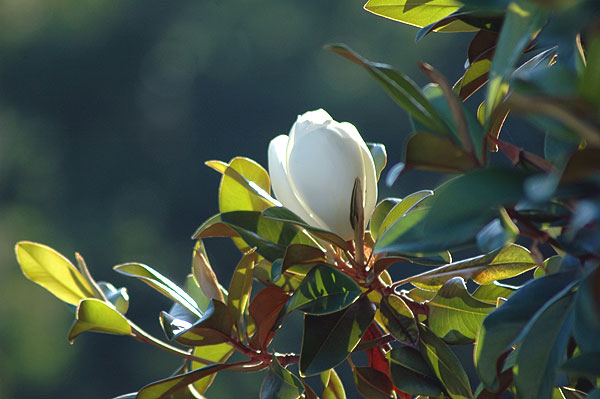
|

|
Magnolia is a large genus of about two hundred ten flowering plant species in the subfamily Magnolioideae of the
family Magnoliaceae.
The name?
There's this -
In 1703 Charles Plumier (1646-1704) described a flowering tree from the island of Martinique
in his Genera. He gave the species, that was locally known as 'Talauma,' the genus name Magnolia, after Pierre Magnol.
The English botanist William Sherard, who studied botany in Paris
under Joseph Pitton de Tournefort, a pupil of Magnol, was most probably the first after Plumier to adopt the genus name Magnolia.
He was at least responsible for the taxonomic part of Dillenius's Hortus Elthamensis and of Catesby's famous Natural
history of Carolina. These were the first works after
Plumier's Genera that used the name Magnolia, this time for some species of flowering trees from temperate North America.
Linnaeus, who was familiar with Plumier's Genera, adopted the genus name
Magnolia in 1735 in his first edition of Systema naturae, without a description but with a reference to Plumier's work.
In 1753, he took up Plumier's Magnolia in the first edition of Species plantarum. As Linnaeus did never see a herbarium
specimen (if there has ever been one) of Plumier's Magnolia and had only his description and a rather poor picture at hand,
he must have taken it for the same plant as Catesby described in 1731 in his Natural history of Carolina and placed
it in the synonymy of Magnolia virginiana var. foetida, the taxon now known as Magnolia grandiflora.
The species that
Plumier originally named Magnolia was later described as Annona dodecapetala by Lamarck, and has since been named Magnolia
plumieri and Talauma plumieri (and still a number of other names) but is now known as Magnolia dodecapetala.
So now you
know.
This is a magnolia grandiflora - or southern magnolia, or bull bay - in bloom on Laurel Avenue, one block north of Sunset Boulevard in Hollywood, at sunset, Tuesday, June 20, 2006. The tree is native to the southeastern United States, from coastal North Carolina south to central
Florida, and west to southeast Texas.
Southern magnolia, of course, is the state tree of Mississippi, but they're all over Hollywood. Maybe that has something to do with filming most all of "Gone
with the Wind" out here in the late thirties, down at the old MGM studios in Culver City, or maybe not.
They provide
deep, cool shade, don't seem to mind the dirty air here, don't take much care, and, if you move up close to a bloom, smell
pretty good.

|

|

|

|

|
If you use any of these photos for commercial purposes I assume you'll discuss that with me
These were shot
with a Nikon D70 - using lens (1) AF-S Nikkor 18-70 mm 1:35-4.5G ED, or (2) AF Nikkor 70-300mm telephoto, or after 5 June
2006, (3) AF-S DX Zoom-Nikkor, 55-200 mm f/4-5.6G ED. They were modified for web posting using Adobe Photoshop 7.0
The
original large-format raw files are available upon request.
|

|

|

